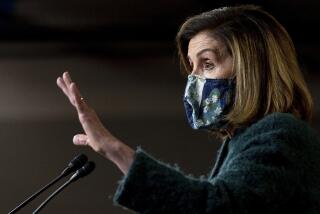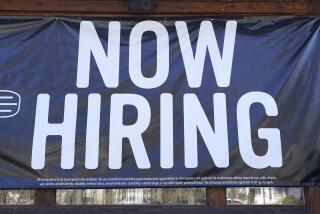It’s deficit versus jobs in recovery
- Share via
WASHINGTON — Under pressure to stop rising joblessness from sinking a fragile recovery, President Obama met Wednesday with top congressional Democratic leaders to fashion new strategies to bolster the U.S. economy.
Obama and the Democrats are caught in a double bind. Having underestimated the severity of the recession early this year, they face tough choices on how to ease the financial pain of millions of jobless workers and ensure that the recovery continues.
Meanwhile, they are under relentless attack from Republicans who argue that the $787-billion stimulus package approved last winter has sent the deficit soaring while failing to bring down unemployment.
That leaves the administration with the sticky challenge of finding effective ways to buoy the economy without appearing to propose more stimulus. Reflecting the political sensitivity of the issue, White House and congressional aides insisted Wednesday that another stimulus plan was not in the works.
Administration policymakers and some outside economists are beginning to worry that the still-embryonic recovery could falter in coming months if no new action is taken. More than 15 million people are unemployed. The U.S. jobless rate hit 9.8% in September and is expected to rise well into next year. Consumer spending, a major engine of economic growth, remains anemic. And most of the existing money from the American Recovery and Reinvestment Act will have been spent by the first half of next year.
Officials would not provide specifics about Obama’s 45-minute meeting with House Speaker Nancy Pelosi (D-San Francisco) and Senate Majority Leader Harry Reid (D-Nev.). But the White House has been looking at continuing key elements of the original stimulus package set to expire by the end of the year. Those include extending unemployment benefits, a subsidy for continuing health insurance for laid-off workers and a tax credit for first-time home buyers.
Also under consideration are various ideas to spur job creation, including a proposal to offer tax credits to businesses that hire new workers or extend the hours of existing employees.
Most economists believe that Obama’s stimulus package, which also included funds for highway projects and teetering local governments, has helped the economy respond to the worst recession since the Great Depression. Some are beginning to call for new government action to sustain the budding recovery.
“The economic case for more intervention is overwhelming,” said Heidi Shierholz, an economist at the Economic Policy Institute in Washington.
U.S. unemployment last month hit a 26-year high. Moreover, job losses accelerated last month from August. That has intensified pressure on the Obama administration, which has been focused on the healthcare overhaul and troubles in Afghanistan and Iran, to do more to improve the U.S. employment situation.
Since the recession began in December 2007, the economy has suffered a net loss of about 8 million jobs, based on revised figures reported Friday. Adding that figure to the number of new jobs needed just to keep up with the growing population, Shierholz estimated that the nation has a deficit of 10.7 million jobs.
The severity of the problem, some economists say, argues for additional stimulus despite the unwanted addition to the government’s deficit.
“The reality is that if we let people just flounder and not help them, we’re shooting ourselves in the foot,” said Heather Boushey, senior economist at the left-leaning Center for American Progress. She said failure to act would lead to more dire social and economic problems.
Congressional Republican leaders and others say that what’s needed are tax cuts for small firms, not more federal stimulus.
“Government job creation is an oxymoron,” said William Dunkelberg, chief economist at the National Federation of Independent Business, a small-employer lobbying group. “The question for Obama is: Where’s he going to get more money for a stimulus? It means more taxes on the table, and if not that, more borrowing.”
The political challenge facing Obama can be seen in legislative bickering over a relatively uncontroversial proposal to extend jobless benefits for three months. The extension bill passed the House more than two weeks ago. But it has been bogged down in the Senate amid differences over how many states should get the extra benefits, among other issues.
Meanwhile, more than 300,000 long-term jobless workers saw their benefits expire last month.
“It’s like they don’t care. Otherwise they would have done something by now,” said a woman in Chico, Calif., who asked that she be identified only by her first name, Diane. The onetime paralegal said she received her last unemployment benefit check Sept. 19.
“It’s sad,” she said. “What do they expect people to live on?”
Obama’s original stimulus package extended the normal 26-week unemployment benefits up to 79 weeks.
It also provided a 65% subsidy for jobless workers to maintain their COBRA medical coverage for up to nine months. Both programs are set to expire at the end of this year. The home buyer’s tax credit of up to $8,000, which has helped to stabilize the housing market, is slated to end Nov. 30.
In a statement after Wednesday’s meeting with Obama and Pelosi in the Oval Office, Reid said an extension of the home buyer tax credit was needed, as well as “creative, innovative ways to encourage businesses to create new jobs.”
White House officials said the president’s economic team had been considering dozens of job-spurring ideas. Among them is a proposal to give a tax credit to businesses that hire workers. The incentive was used in the 1970s, but members of Congress have expressed concerns that it would amount to a subsidy for businesses and be subject to abuse.
Obama administration officials said this week that these discussions were preliminary and that they did not have cost estimates for continuing some of the safety-net provisions in the original stimulus. But according to some estimates, extending the jobless benefits support for another year could run about $100 billion.
--
More to Read
Get the L.A. Times Politics newsletter
Deeply reported insights into legislation, politics and policy from Sacramento, Washington and beyond. In your inbox twice per week.
You may occasionally receive promotional content from the Los Angeles Times.











